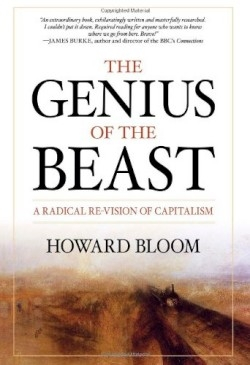The Genius of the Beast
A Radical Re-Vision of Capitalism
In this recapitulation of the universe’s evolutionary thrust-and humanity’s part in it-Howard Bloom proves to be a provocative, even an inspiring, thinker. But he is not wholly persuasive. Capitalism succeeds, he argues, because it recognizes and caters to human desires whether they are base or noble. In doing so, it produces side effects and unintended consequences that tend ultimately to benefit whole societies. He cites, for example, the “Tulip Craze” of the 1600s, during which wealthy people in Europe, and particularly Holland, paid great sums for tulip bulbs developed in Turkey. The resulting commerce with Turkey, he contends, led to the importation into the West of Eastern ideas as well, an important one of which was the practice of inoculation to prevent disease.
“Create what delights you,” Bloom counsels,”-no matter how frivolous it may seem-and your useless display of trinkets, toys, and treasures may come in handy some day. If not for you then for one of your great, great grandkids down the human line.”
To buttress his thesis that human evolution tends toward characteristics that favor a capitalist economy, Bloom draws on intriguing and instructive parallels from an array of academic disciplines, among them astrophysics, biology, archeology, paleontology, behavioral psychology, literature, music, and mass communications.
While he makes a convincing case that capitalism is the most fertile seedbed of innovation (and the political openness that generally goes with it), Bloom pays scant attention to the system’s corrosive inequities. He assigns more value to ideas and grand schemes-as if they were transformative in and of themselves-than he does to the anonymous labor that is essential to bring each of these schemes to fruition, and to the market. Nor does he acknowledge that capitalism gauges its own health, in great part, by how cheaply it can pay its labor. Moreover, Bloom fails to address capitalism’s effect on the world’s diminishing natural resources. Can it continue indefinitely to be more bountiful to more people without consuming the planet?
These reservations aside, Bloom is clearly onto something when he says, “History is the struggle of fantasy to become reality,” and that capitalism is probably the most potent realizer of fantasies. Whether its excesses can be curbed by selfless acts of individual will, as he suggests, is another-and dicier-matter altogether.
Disclosure: This article is not an endorsement, but a review. The publisher of this book provided free copies of the book to have their book reviewed by a professional reviewer. No fee was paid by the publisher for this review. Foreword Reviews only recommends books that we love. Foreword Magazine, Inc. is disclosing this in accordance with the Federal Trade Commission’s 16 CFR, Part 255.

